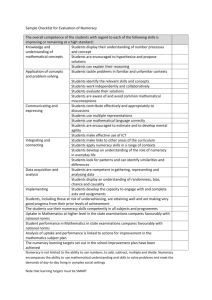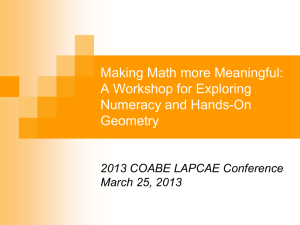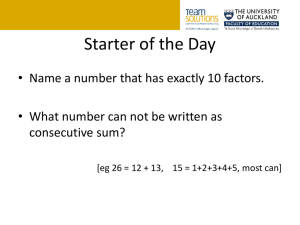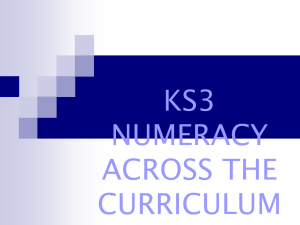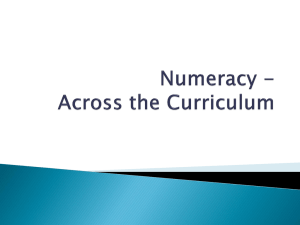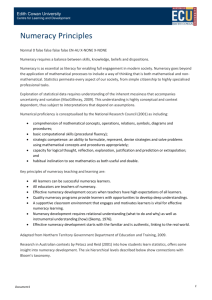Numeracy Theories & Frameworks Module Handbook - Teesside University
advertisement
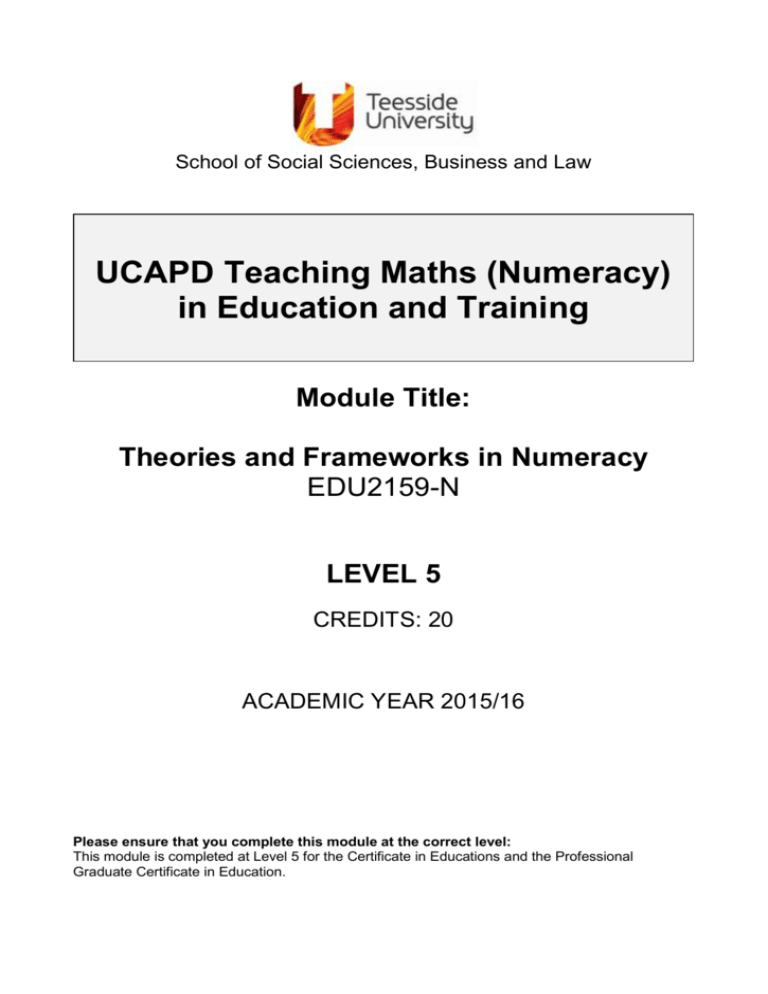
School of Social Sciences, Business and Law UCAPD Teaching Maths (Numeracy) in Education and Training Module Title: Theories and Frameworks in Numeracy EDU2159-N LEVEL 5 CREDITS: 20 ACADEMIC YEAR 2015/16 Please ensure that you complete this module at the correct level: This module is completed at Level 5 for the Certificate in Educations and the Professional Graduate Certificate in Education. Module Aims This module aims to develop an understanding of theories and principles relating to numeracy and mathematics learning and development. Trainees will investigate personal, historic, cultural and political factors on the development and progression of numeracy and mathematics learners. This module also aims to encourage critical analysis of activities, processes and stages within numeracy and mathematics problems and investigations, through which, trainees should identify common errors and misconceptions in numeracy and mathematics. Furthermore, this module aims to give trainees the skills to critically analyse data representation and use of measurement systems within problem solving. Indicative Content Theories and principles relating to numeracy and mathematics learning and development. Personal, social, economical and political factors on the development and progression of numeracy and mathematics learners. Historic and cultural development of numeracy and mathematics. Language and concepts associated with number systems. Common errors and misconceptions in numeracy and mathematics. Techniques used in numeracy and mathematics for conceptual linkages. Activities, processes and stages within numeracy and mathematics problems and investigations. Written, mental and diagrammatic mathematical strategies, and associated meta-language. Use, interpretation and representation of data. Use of measurement systems within problem solving. The role and perceptions of numeracy and mathematics within society. Teaching and Learning This module will draw on a range of learning and teaching approaches appropriate to the nature of the cohort profile and the individual needs of the trainees. Throughout all taught and tutor led sessions a range of good practice in learning and teaching will be modelled, discussed and evaluated. This will draw upon best and new practice from a range of sectors and settings including compulsory education, FE, training organisations and HE. As with all other modules on the programme this module will not be delivered as a discreet unit rather it will be explicitly linked at all times to the practical modules that trainees will be completing concurrently. It is expected that the theoretical taught content of this module will be delivered in ways that demonstrates a range of practical delivery methods. Experiences and knowledge gained through this module may impact the reflection and tracked development evident in the Individual Learning Plan. Trainee progress will also be supported through: seminars focusing on an evaluation specific strategies, experiences and scenarios a range of reflective activities (written, oral, individual and group) lectures and, where applicable, guest lectures from specialists interactive workshops that model a range of learning and teaching strategies VLE access, resources and moderated discussion formative and summative written and oral assessment; formative assessment will not be restricted to assignments highlighted Main Learning Outcomes Knowledge & Understanding 1. Demonstrate a comprehensive understanding of personal, historic, cultural and political factors on the development and progression of numeracy and mathematics learners. 2. Critically analyse theories and principles relating to numeracy and mathematics learning and development. 3. Apply an understanding of number; measures, shape and space; and handling data to the teaching of numeracy and mathematics. Cognitive & Intellectual Skills 4. Critically evaluate common errors and misconceptions in numeracy and mathematics. 5. Analyse the role and perceptions of numeracy and mathematics within society. 6. Analyse the use, interpretation and representation of data representation and use of measurement systems within problem solving. Practical & Professional Skills 7. Demonstrate the ability to make links between numeracy and mathematics learning and development within the broader context of education and teaching. 8. Apply theoretical knowledge and understanding of numeracy and mathematics development to the development and selection of appropriate learning and teaching strategies Key Transferable Skills 9. Reflect systematically on the impact of external factors on the development of numeracy and mathematics skills. 10. Select and use a range of communication methods appropriate for the context. Attendance Students are expected to attend all lectures, seminars, workshops and any other scheduled teaching activity. It is through interpersonal exchanges with tutors and peers that experiential learning and the testing of ideas takes place and the University has strong evidence that good attendance is related to success in assessments. Attendance will be monitored and if there is evidence that you are not engaging with University studies then you may be withdrawn from the programme. Assessment Please see the assessment guide for detail. Summative Assessment ICA 40% of module marks (evaluative account) ECA 60% of module mark (report) Assessment Criteria Standard Teesside University UG Level 5 will be used. Assessment Submission See timetable for hand-in dates and details. Late submission will result in only a pass grade of 40% being awarded. Academic Support and Guidance Formal individual tutorials are built into the module delivery. These tutorials will focus explicilty on trainees progress in the academic aspects of the programme with specific reference to the development of appropriate academic writing skills and practices. In addition further tutorial support will be available as needed at times that are arranged between the tutor and the trainee. On-going support will be provided to the students via email correspondence with the module tutor and/or personal tutor and by the provision of supporting materials available via the VLE. Reading List Purchase Griffiths, G. and Stone, R. (2013) Teaching Adult Numeracy, Principles and Practice, Maidenhead: Open University Press Essential Barton, D. and Tusting, K. (2005) Beyond Communities of Practice: Language, Power and Social Context, Cambridge: Cambridge University Press Bynner, J. and Parsons, S. (2006) New Light on Literacy and Numeracy, London: NRDC [online] http://www.nrdc.org.uk/publications_details.asp?ID=78 Casey, H. National Research and Development Centre for Adult Literacy and Numeracy, (2007) Getting the practical teaching element right: A guide for literacy, numeracy and ESOL teacher educators [online] http://eprints.ioe.ac.uk/2191/ Tett, L., Hamilton, M. and Hillier, Y. (2006) Adult Literacy, Numeracy and Language: Policy, Practice and Research, Maidenhead: Open University Press Recommended Lawton, T. and Turnbull, T. (2007) Inclusive learning approaches for literacy, language, numeracy and ICT, London: Lifelong Learning UK, [online] http://webarchive.nationalarchives.gov.uk/20130401151715/http://www.education.gov.uk/publicatio ns/eOrderingDownload/LLUK-00680-2007.pdf Coben, D. and National Research and Development Centre for Adult Literacy and Numeracy (2007) Effective Teaching and Learning: Numeracy, [online] http://www.nrdc.org.uk/publications_details.asp?ID=85 Journals Adult Learning (Washington, D.C.) Electronic NRDC: National Research and Development Centre for Adult Literacy and Numeracy http://www.nrdc.org.uk/ The Excellence Gateway http://www.excellencegateway.org.uk/ Skills for Life Network: http://www.skillsforlifenetwork.com/ NIACE : The National Institute of Adult Continuing Education http://www.niace.org.uk/ Regulations and Procedures Naturally within the University there are a number of regulations which you may need to refer to as you progress through this module and the University generally. The University has placed these regulations on the University Website at: http://www.tees.ac.uk/docs/index.cfm?folder=Student%20Regulations

